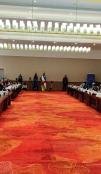EU and Election Observation

Election observation missions (EOMs) provide a comprehensive, independent and impartial assessment of an electoral process according to international standards for democratic elections. The EU is a worldwide recognised credible actor in international election observation. Since 2000, 147 EU EOMs have been deployed in Africa, the Middle East, Asia, Latin America and the Caribbean.
An observation mission assesses all aspects of the electoral process, including its legal framework, the delimitation of constituencies, the registration of voters and candidates, the training of election staff, voter education, media coverage, the campaign and the preparations for the vote, as well as the appeals process. On election day observers visit polling stations in order to assess the opening, voting, counting and aggregation of results. This is done according to the principles of independence, full coverage, impartiality, transparency, professionalism and non-interference in the process.
This helps to promote public confidence in the electoral process and may serve to promote electoral participation and mitigate the potential for election-related conflict. EU EOMs follow a very precise methodology that is a warrant of the implementation of these principles. In its final report, an EU EOM offers recommendations for improving the integrity and effectiveness of future electoral processes and the wider process of democratisation.
EU EOM recommendations have a wider scope than electoral reform and touch on issues such as free media, active and engaged CSOs, an independent judiciary, human rights and democratic institutions. They can be used as the basis for informing electoral assistance projects supporting democratisation processes in partner countries.





